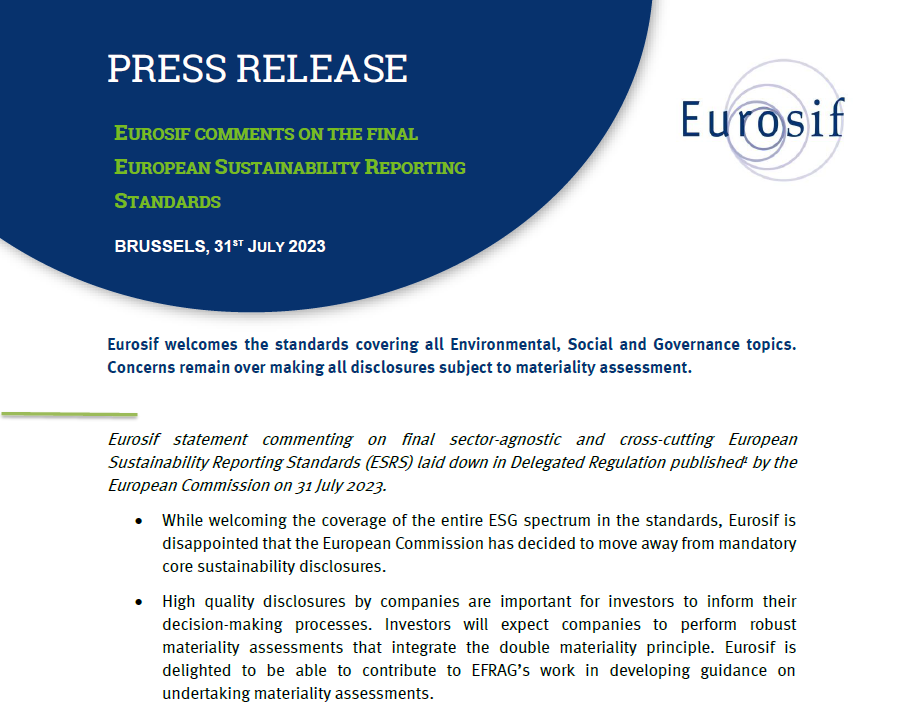Eurosif comments on final European Sustainability Reporting Standards
Eurosif welcomes the standards covering all Environmental, Social and Governance topics. Concerns remain over making all disclosures subject to materiality assessment.
Eurosif statement commenting on final sector-agnostic and cross-cutting European Sustainability Reporting Standards (ESRS) laid down in Delegated Regulation published[1] by the European Commission on 31 July 2023.
- While welcoming the coverage of the entire ESG spectrum in the standards, Eurosif is disappointed that the European Commission has decided to move away from mandatory core sustainability disclosures.
- High quality disclosures by companies are important for investors to inform their decision-making processes. Investors will expect companies to perform robust materiality assessments that integrate the double materiality principle. Eurosif is delighted to be able to contribute to EFRAG’s work in developing guidance on undertaking materiality assessments.
- Investors and other financial market participants’ own reporting requirements under the Sustainable Finance Disclosure Regulation (SFDR), EU Climate Benchmarks Regulation and Pillar 3 rules will require high quality disclosures from companies including on key climate indicators (scope 1, 2, and 3 GHG emissions, climate targets, net zero transition plans)[2] and other sustainability metrics.
Timely and well implemented European Sustainability Reporting Standards have the potential to play a crucial role in the transition to a sustainable low carbon economy. Improved availability of quality, comparable and reliable corporate sustainability disclosures is essential for investors and other finance providers to make informed investment and financing decisions. As emphasised in a joint investor and financial industry statement, co-signed by Eurosif, PRI, IIGCC, EFAMA and UNEP FI as well as 92 companies, investors and other financial market participants need specific ESG metrics to allocate capital in line with EU Climate Law and Green Deal objectives.
The success of the European Sustainability Reporting Standards now largely depends on the reporting companies and their advisors, consultants, auditors and assurance providers. Performing robust materiality assessments that truly integrate the double materiality principle is essential. As these concepts are still relatively new, companies and their advisors should be upskilling key staff to ensure a sufficient degree of expertise on sustainability.
Aleksandra Palinska, Executive Director of Eurosif, commented: “We regret that the investors’ calls to retain key ESG indicators as mandatory have not been heard. Investors need specific corporate disclosures to allocate capital in line with EU Climate Law and Green Deal objectives and to prepare their own sustainability-related disclosures. We are counting on the reporting companies to consider these disclosures, elaborated in the joint investor statement, as always material. This is essential for the success of the EU sustainable finance framework.”
[1] EC press release; text of the Delegated Acts
[2] To mitigate accelerating climate change and meet the EU’s climate goals, key climate disclosures, including scope 1, 2 and 3 GHG emissions, climate targets and transition plans should always be considered material. The importance of these metrics for investors to efficiently allocate capital was highlighted in a recent report by Eurosif.

